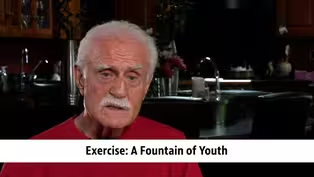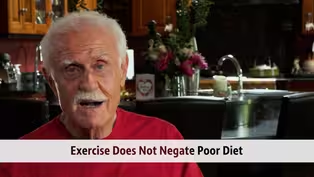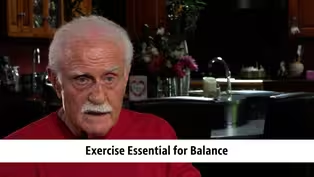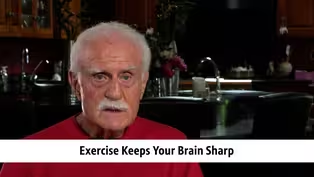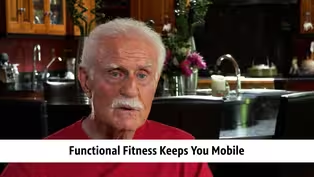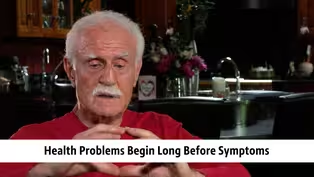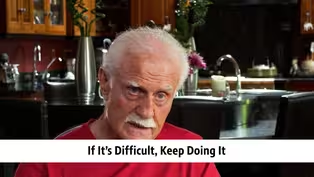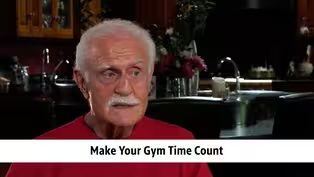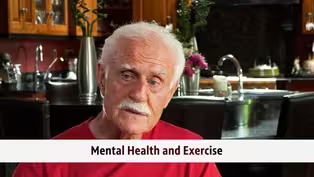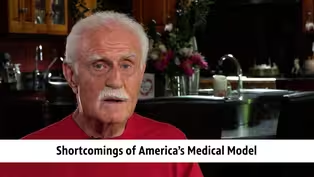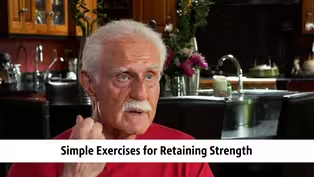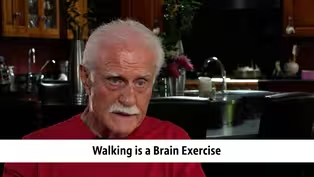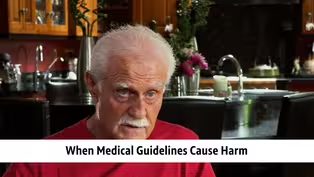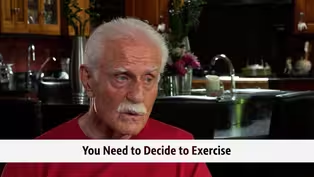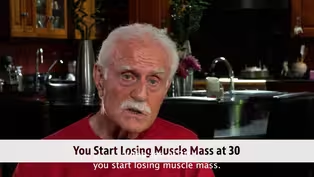KET Forums
Why Now is the Time to Change Your Lifestyle
Clip: Episode 29 | 4m 34sVideo has Closed Captions
Dr. Bryant Stamford discusses why now is the time to change your lifestyle.
Dr. Bryant Stamford, professor of Kinesiology and Integrative Physiology at Hanover College, discusses why now is the time to change your lifestyle.
Problems playing video? | Closed Captioning Feedback
Problems playing video? | Closed Captioning Feedback
KET Forums is a local public television program presented by KET
KET Forums
Why Now is the Time to Change Your Lifestyle
Clip: Episode 29 | 4m 34sVideo has Closed Captions
Dr. Bryant Stamford, professor of Kinesiology and Integrative Physiology at Hanover College, discusses why now is the time to change your lifestyle.
Problems playing video? | Closed Captioning Feedback
How to Watch KET Forums
KET Forums is available to stream on pbs.org and the free PBS App, available on iPhone, Apple TV, Android TV, Android smartphones, Amazon Fire TV, Amazon Fire Tablet, Roku, Samsung Smart TV, and Vizio.
Providing Support for PBS.org
Learn Moreabout PBS online sponsorshipWhen you think about general health, all right?
And you think about the kinds of diseases that we experience, the chronic disease, heart disease, diabetes, high blood pressure on.
The problem is these diseases, you don't get any symptoms at all of a problem until they are very, very advanced.
Just given human nature and I and I have conversations with folks like this every day that given given human nature, if you're talking about, gee, maybe you need to make some changes.
And they'd be like, Why?
I've been doing this exact same thing for if I'm older now, 65 years and look, I'm fine.
The problem is that the disaster of these chronic diseases doesn't hit until they are very, very advanced.
And then maybe you get an inkling of a problem.
I mean, you hear all the time about I hear stories about, okay, hey, have you seen Joe lately?
Yeah, I saw him last week.
Why?
Why?
Why do you ask?
Oh, he just had a heart attack and died.
Like, what?
Did that come from out of nowhere?
No, actually, it's been building for the last 40 to 50 years.
Okay.
But zero symptoms.
I mean, that's.
That's the problem that we face, that people are doing the same things and thinking they're getting away with it.
And so if you don't get any symptoms and that's our medical model, and that's the biggest problem that we have in in dealing with people try to getting the change to prepare for later in life.
Our medical model, which is on the one hand wonderful in some ways, but it's symptom driven.
All right.
It was put together at a time when if you came down with typhoid fever, smallpox, cholera, you had tremendous symptoms.
All right.
You knew obviously, you were really ill. You dashed to the doctor.
I need help.
All right.
Well, we still apply that.
That same that same approach to chronic diseases that don't operate that way.
If you think about it, what are you told to do on a daily basis in terms of self-examination?
Comes to cancer.
You thought, well, look for lumps.
Okay.
Well, goodness gracious, if I find a lump in my thinking.
Yeah.
Boy, I'll bet it started this morning.
No, it started a long time ago.
And if I can feel it through layers of tissue, it's been going a long, long time.
So the question you would ask your body is.
My body has betrayed me, right?
My body has betrayed me.
But here's the thing.
Early in life, we give our body a directive.
Okay.
And this is also devastating.
We give our body the directive that says whatever is going on inside there, I don't want to know.
You take care of it.
And the body listens.
The body says, Fine.
I will take care of it.
All right.
And so cancer develops.
And so you think, boy, my body betrayed me.
So you say to your body, boy, you betrayed me.
Why did you do that?
But wait a minute.
Remember when you told me very early in life, whatever is going on inside there, you don't want to know.
I did everything I could to keep that from you.
But as it grew and grew and grew, I couldn't keep it from you anymore.
And you discovered it.
All right.
So from betrayal perspective, it's like, gee, you know what?
If you had told me that that first cancer cell was there, we could have obliterated, boom, no cancer.
Okay.
If you'd told me that my arteries are clogging up with cholesterol.
Way back when.
No problem.
No heart attacks, strokes.
All right.
But we are betrayed by our bodies.
We think when our bodies are just doing what we told them to do, we don't want to know.
And that's.
That's our symptom driven society.
We think we're doing fine.
I hear it all the time.
I'm doing fine.
Don't worry about me.
I'm doing fine.
Next thing you hear, some major issue has finally struck because you could literally be a hair's breath away from a stroke or a heart attack.
And I'm dealing with people all the time trying to get them to understand the issues and occasionally I'm successful, but not very often.
No.
Video has Closed Captions
Clip: Ep29 | 2m 23s | Dr. Bryant Stamford discuss how exercise is a fountain of youth. (2m 23s)
Exercise Does Not Negate Poor Diet
Video has Closed Captions
Clip: Ep29 | 2m 30s | Dr. Bryant Stamford discusses how exercises does not negate poor diet choices. (2m 30s)
Exercise is Essential for Balance
Video has Closed Captions
Clip: Ep29 | 1m 6s | Dr. Bryant Stamford discusses how exercise is essential for balance. (1m 6s)
Exercise Keeps Your Brain Sharp
Video has Closed Captions
Clip: Ep29 | 3m 22s | Dr. Bryant Stamford discusses how exercise keeps your brain sharp. (3m 22s)
Functional Fitness Keeps You Mobile
Video has Closed Captions
Clip: Ep29 | 2m 56s | Dr. Bryant Stamford discusses how functional fitness keeps you mobile. (2m 56s)
Health Problems Begin Long Before Symptoms
Video has Closed Captions
Clip: Ep29 | 2m 41s | Dr. Bryant Stamford discusses how health problems begin long before symptoms start. (2m 41s)
If It's Difficult, Keep Doing It
Video has Closed Captions
Clip: Ep29 | 4m 38s | Dr. Bryant Stamford discusses why it is important to keep doing exercises that are difficult. (4m 38s)
Video has Closed Captions
Clip: Ep29 | 1m 39s | Dr. Bryant Stamford discusses why it is important to make your gym time count. (1m 39s)
Video has Closed Captions
Clip: Ep29 | 2m 58s | Dr. Bryant Stamford discusses the connection between mental health and exercise. (2m 58s)
Shortcomings of America's Medical Model
Video has Closed Captions
Clip: Ep29 | 2m 26s | Dr. Bryant Stamford discusses shortcomings of America's medical model. (2m 26s)
Simple Exercises for Retaining Strength
Video has Closed Captions
Clip: Ep29 | 2m 19s | Dr. Bryant Stamford discusses some simple exercise ideas that can help you retain strength. (2m 19s)
Video has Closed Captions
Clip: Ep29 | 2m 12s | Dr. Bryant Stamford discusses how walking is a brain exercise. (2m 12s)
When Medical Guidelines Cause Harm
Video has Closed Captions
Clip: Ep29 | 5m 25s | Dr. Bryant Stamford discusses how medical guidelines can sometimes cause harm. (5m 25s)
You Need to Decide to Exercise
Video has Closed Captions
Clip: Ep29 | 5m 44s | Dr. Bryant Stamford discusses the importance of deciding to exercise. (5m 44s)
You Start Losing Muscle Mass at 30
Video has Closed Captions
Clip: Ep29 | 6m 55s | Dr. Bryant Stamford discusses how you start losing muscle mass at 30. (6m 55s)
Providing Support for PBS.org
Learn Moreabout PBS online sponsorship
- News and Public Affairs

Top journalists deliver compelling original analysis of the hour's headlines.

- News and Public Affairs

FRONTLINE is investigative journalism that questions, explains and changes our world.












Support for PBS provided by:
KET Forums is a local public television program presented by KET
